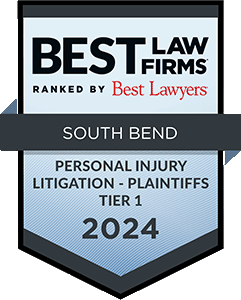 Documenting a personal injury properly is essential to the success of your personal injury lawsuit. While often overlooked, this documentation provides valuable facts supporting the severity of your injury and your pain and suffering.
Documenting a personal injury properly is essential to the success of your personal injury lawsuit. While often overlooked, this documentation provides valuable facts supporting the severity of your injury and your pain and suffering.
Documenting your personal injury the right way may help you recover the compensation you need. Pfeifer, Morgan & Stesiak’s South Bend personal injury lawyers have provided these detailed steps you should take to record the effects of your injury.
To find out if you have a case against the at-fault party in your accident, contact us to schedule a free, no obligation consultation. We will carefully review your claim to inform you of which legal options may be available.
Seek Medical Attention
If you suffer an injury in an accident, you should seek medical attention as soon as possible. Even if your injury does not seem severe, obtaining medical treatment establishes that you were involved in an accident and begins documenting your injury.
Once a health care provider diagnoses your injury or condition, request copies of your medical records. This may include copies of any medical imaging tests, blood work, prescription medications or treatment plan that shows the extent of your injury.
Take Pictures of Your Injury
Pictures of your injury can be used as evidence in your claim. Try to take photos of your injury starting right after the accident, if possible.
Continue to photograph your injuries as you heal to show how it has responded to medical treatment. Also, try to date each photograph to establish a timeline of how your injury has healed.
Take Notes About Your Recovery
Keep notes as you progress through treatment for your injury. Note dates of treatments and doctors’ visits, surgeries, therapies and other types of medical treatment you receive.
As you record notes about your injury, try to describe how it has affected you. This may also include the pain you are experiencing and how your injury has responded to medical treatment.
Keep an Injury Journal
Throughout the course of your recovery, you should consider keeping a journal to document the effects of your injury. An injury journal should focus on how your life has been changed by the injury, as well as the progress of your recovery.
When you begin your journal, you should include daily entries about the pain you have been experiencing and any physical limitations you have encountered due to your injury. Also, you may include entries about how your injury has affected your work and personal life.
If you experience psychological effects due to your injury, such as emotional distress or changes in behavior, be sure to include these issues as well.
Talk to Witnesses
Witnesses can be very useful to your personal injury case and may provide information you were unaware of regarding your accident.
If possible, try to gather names and contact information for any witnesses who saw the accident take place. If you cannot speak to witnesses because you require immediate medical care, ask someone remaining at the accident scene to do so for you.
Collect Your Medical Records
When you receive medical treatment, remember to request copies of all medical records pertaining to the diagnosis and treatment of your injuries.
Your medical records will help to support your claim. This may include showing the cost of your medical expenses and that your injury is not a pre-existing condition.
Throughout the course of your medical treatment, you should save the following medical records:
- Bills for your treatment, medical tests, medical assistive equipment and prescription medication
- Receipts for out-of-pocket expenses, such as the cost of travel to and from doctors’ appointments
- Time cards or recent pay stubs that detail the wages you lost due to your injury
- Mileage records of traveling to your doctors’ appointments or attorney’s office
Contact Us for a Free Consultation
If you were injured in an accident caused by another’s negligence, you may be entitled to compensation for your medical bills, lost wages, and pain and suffering. Documenting your injury and its effects may provide helpful evidence for you during this time.
Schedule a free, no obligation consultation with Pfeifer, Morgan & Stesiak to learn more about the legal options that may be available to you. We do not charge upfront fees for our services and only require payment if we recover compensation for your claim.
Call (574) 444-0741 and speak to a lawyer today.











